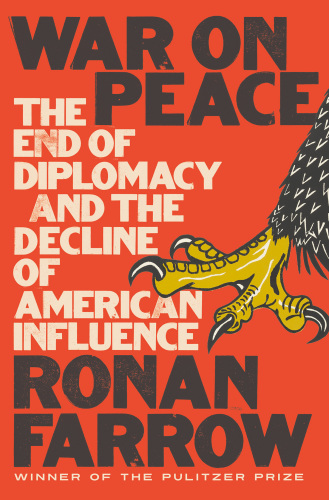
War on Peace
The End of Diplomacy and the Decline of American Influence
کتاب های مرتبط
- اطلاعات
- نقد و بررسی
- دیدگاه کاربران
نقد و بررسی

May 7, 2018
War has eclipsed diplomacy as the main instrument of U.S. foreign policy with dire consequences, according to this searching exposé of a crumbling State Department. New Yorker journalist Farrow, a former State Department official, examines the decadeslong waning of the department’s clout as its budgets were slashed and its diplomatic counsels ignored by presidents who pursued military solutions to global crises. The results, he argues, were disastrous. The U.S. backed brutal warlords in Afghanistan and rejected possible settlements with the Taliban; sponsored a counterinsurgency that killed countless civilians in Colombia; in Somalia supported warlords and an Ethiopian invasion against a relatively innocuous Islamic regime, sparking Islamist terrorism; and, in the Trump era, struggles with the damage from presidential policy-by-tweet. Farrow blends analysis with vivid reportage (his portrait of Afghan warlord Ahmed Rashid Dostum, in a palace furnished with reindeer, shark tank, and Christmas lights, is classic); his firsthand recollections of State Department icons, such as the brilliant, blustering Richard Holbrooke, make diplomacy feel colorful and dramatic rather than gray and polite. Farrow doesn’t quite demonstrate how diplomacy would succeed in quagmires like Afghanistan, but his indictment of the militarization of American foreign policy is persuasive. Photos.

Nations deal with each other through trade and diplomacy--or war. Guess which one the current administration favors?"Diplomats perform many essential functions--" writes New Yorker contributor Farrow, perhaps best known for breaking the story of film executive Harvey Weinstein's long pattern of sexual depredations, "spiriting Americans out of crises, holding together developing economies, hammering out deals between governments." In the absence of diplomacy, the most likely alternative is war, and by the author's account, the tendency of American foreign policy since the George W. Bush administration has been militarized. (In this, he notes, the Obama administration is not blameless.) Farrow profiles many men and women who have spent time in Foggy Bottom, the headquarters of a State Department that has been all but emptied. Says former diplomat Tom Countryman, whereas in former transitions, "there were people who were knowledgeable about foreign affairs...who had experience in government," Donald Trump's team brought none of this to the table. Farrow contrasts this with the likes of Richard Holbrooke, Colin Powell, Hillary Clinton, and even the freelancing Joanne Herring, who helped convince Texan Charlie Wilson to push for funding for the mujahedeen--"in the view of some, laying the foundations for 9/11." In the vast vacuum between experience and what we have now--i.e., arrogance wedded to incuriosity and indifference--Farrow warns that "the balance of global diplomatic power is shifting." American diplomats may be missing from the conversation, but Chinese diplomats are everywhere winning influence for their country. The author's interlocutors warn that it might take years to rebuild the State Department, to say nothing of America's reputation; even Condoleezza Rice warns that the diminution of America's commitment to a democratic diplomatic mandate "would be a spectacularly bad idea."Excellent, wide-ranging reporting and sharp-edged analysis make this a book that's sure to be talked about inside the Beltway--and that deserves a wide audience beyond.
COPYRIGHT(2018) Kirkus Reviews, ALL RIGHTS RESERVED. (Online Review)

























دیدگاه کاربران